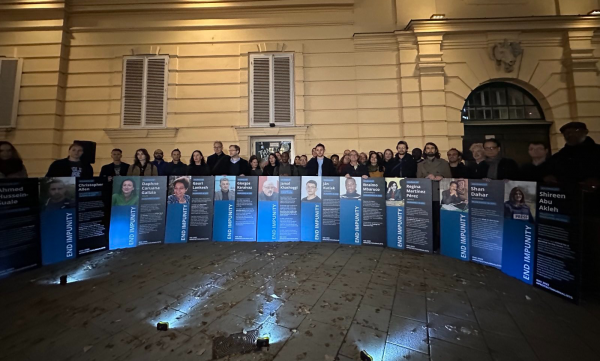While world leaders await action from Syria on surrendering its chemical weapons stockpile, at least nine foreign journalists and numerous Syrian journalists have been kidnapped or remain missing inside the country since fighting began in 2011, research from the International Press Institute (IPI) shows.
The number of journalists kidnapped every year has increased since the beginning of the conflict, which has entered its third year, and more kidnappings have been recorded in 2013 than in the two previous years, the IPI research shows.
“The difficulties in collecting and verifying information about journalists arrested and kidnapped in Syria are immense and it is likely that the total number of journalists currently held or missing in Syria is even higher than the 34 journalists we have counted,” IPI Press Freedom Manager Barbara Trionfi said. “There is no doubt that the Syrian authorities are responsible for the safety of any journalists working in their territory, and anti-government groups also must respect the status of journalists as non-combatants. But it is vital that employers ensure that any journalist, local or foreign, sent to cover the conflict is well equipped and aware of the dangers they are facing and the best possible way to avoid them.”
“The risks of covering a conflict can never be eliminated, but they can be controlled,” Trionfi added.
While the large majority of journalists missing, arrested or kidnapped are Syrian, some working for state media, others for foreign-based media and online news website, foreign journalists currently missing in Syria include American, Jordanian, Mexican, Hungarian, French, Spanish and Polish nationals.
Numerous bloggers, so-called “media activists”, as well as media support staff has also been kidnapped or missing.
With a growing number of rebel groups and increasing lawlessness in rebel-held areas, travel within the country is increasingly dangerous. Kidnappers have sought to abduct journalists for ransom, while jihadist groups have accused reporters of being spies and even threatened to kill them.
Syria is one of the most dangerous and deadly countries in the world for journalists. According to IPI’s Death Watch, at least 51 journalists have been killed in the country since the current conflict between loyalist and anti-government forces began in March 2011.
Mazen Mahfoud, a broadcaster and editor for state-run Syrian TV, told IPI that working as a journalist in Syria has become full of risk. He said in a telephone interview that journalists regularly received threats and confirmed that they are subject to kidnapping and killing.
He recounted that on Feb. 8, 2012, a group of armed gunmen stormed the house of his brother, Mohammed Mahfoud, an editor for Syria’s state-run newspaper Alouruba published in the province of Homs. The armed gunmen took him to an unknown destination after seizing his personal computer and mobile phones. The journalist’s fate is still unknown.
Syria’s civil war and large areas of disputed control make it difficult to independently confirm the status or condition of those reported kidnapped or missing. Some media organisations have also refrained from providing details of journalists who are being held due to ongoing negotiations for their release.
But other organisations also have catalogued a series of attacks and assaults. In May 2013, Amnesty International reported that scores of journalists had been killed, arbitrarily arrested, detained, subjected to forced disappearances and tortured since Syria’s internal conflict erupted in 2011.
A recent United Nations’ report says both Syrian rebel groups and government forces conflict are committing war crimes and crimes against humanity. According to the UN report, some opposition groups and Syrian government forces are seizing journalists, humanitarian workers and other foreigners.


